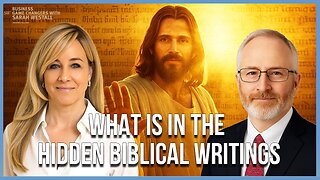Premium Only Content

Episode 3235: Book of the Bible - Habakkuk
The Book of Habakkuk
HAB-uh-cook
Introduction (Sharon)
Well, welcome back to Catholic Reboot where we will discuss the Book of Habakkuk is unique among the prophets. Rather than addressing the people directly, Habakkuk dialogues with God. He cries out about injustice: Why do the wicked prosper? Why does God allow evil to triumph?
God responds, not with immediate solutions, but with a call to faith: “The just shall live by his faith” (Habakkuk 2:4).
For Catholics, Habakkuk is a book of deep consolation. It teaches that even in times of corruption, suffering, and unanswered questions, our task is to live faithfully — trusting that God’s justice will prevail in His time.
Opening Prayer
“In the name of the Father, and of the Son, and of the Holy Ghost. Amen.
O Lord, who gave Your prophet Habakkuk the grace to question and yet to trust, grant us patient faith in times of trial. Teach us to live by faith when we do not see justice, and to rejoice in You when all earthly comforts fail.
Through the intercession of Our Lady, Virgin Most Faithful, keep us steadfast until Christ returns in glory. Amen.”
Dialogue:
• Sharon (host): “Welcome to today’s episode, where we begin our journey into the Book of Habakkuk. Unlike other prophets who speak directly to the people, Habakkuk speaks to God. His words echo the cries of the faithful: ‘How long, O Lord?’”
• Walt (co-host): “That’s right. Habakkuk lived in the late 7th century B.C., as Assyria fell and Babylon rose to power. Judah was collapsing spiritually. Corruption, idolatry, and violence filled the land. Habakkuk saw it all and questioned: why does God seem silent?”
• Sharon: “This makes Habakkuk so relatable. Haven’t we all asked that question? We look at our Church, our nation, even our families, and wonder: Where is God’s justice?”
• Walt: “Exactly. And yet, through this book, God teaches us not resignation, but faith. His key message: ‘The just shall live by faith.’”
Patristic Insight (Walt):
“St. Jerome called Habakkuk a prophet of dialogue one who dared to wrestle with God in prayer. And St. Augustine reminds us that God’s patience is not absence, but a test of our faith.”
Reflection Question (Sharon):
“When I see corruption around me, do I cry out to God in prayer like Habakkuk, or do I fall into despair?”
Historical and Spiritual Context (Walt):
1. The Setting
• Habakkuk likely prophesied in the late 7th century B.C., during a time of great turmoil.
• The Assyrian Empire was collapsing, and the Babylonians (Chaldeans) were rising as the new world power.
• Judah, the Southern Kingdom, was in spiritual and moral decline: idolatry, violence, and injustice filled the land.
2. The Problem
Habakkuk sees two evils:
1. Corruption within Judah the law is ignored, justice is perverted.
2. Threat from without — God allows the violent Babylonians to rise as His instrument of judgment.
3. The Uniqueness of Habakkuk
Unlike most prophets, Habakkuk doesn’t begin by speaking to the people. He begins by wrestling with God: Why do You allow this? Where is Your justice?
Spiritual Note: This makes Habakkuk very relatable. He gives voice to the cry of every faithful soul who suffers under evil and wonders: “Lord, how long?”
Chapter 1 — The Cry of the Prophet
Theme: Habakkuk questions God about injustice; God answers with the rise of Babylon.
Scripture Reading (Sharon): Habakkuk 1:2–3, 6.
How long, O Lord, shall I cry, and Thou wilt not hear? Why dost Thou shew me iniquity and wrong, to see rapine and injustice before me? Oppression and violence are before me: and there is a judgment, but the contention is more powerful. … For behold, I will raise up the Chaldeans, a bitter and hasty nation, marching upon the breadth of the earth, to possess dwelling places that are not their own.”
Dialogue:
• Sharon: Habakkuk begins with anguish: ‘How long, O Lord, shall I cry, and Thou wilt not hear?’ He sees violence in Judah and feels abandoned.
• Walt: God answers but not how Habakkuk expects. He says: ‘I will raise up the Chaldeans, a bitter and hasty nation.’ God will use Babylon, an even more wicked power, to punish Judah.
• Sharon: This raises another question: how can a holy God use evil to punish evil?
• Walt: St. Augustine compared this to medicine. Sometimes the cure is bitter, but it heals. God uses even wicked nations as His instruments but then He judges them too.
Spiritual Application (Sharon):
“In our times, we may feel abandoned when evil prospers. But God’s silence is not absence He is working in ways we don’t see.”
Reflection Question (Walt):
Do I trust God’s providence, even when His methods confuse me? Or do I demand answers on my own terms?
Chapter 2 — The Just Shall Live by Faith
Theme: God assures Habakkuk that Babylon will be judged. The faithful must live by faith.
Scripture Reading (Walt): Habakkuk 2:1, 4.
I will stand upon my watch, and fix my foot upon the tower: and I will watch, to see what will be said to me, and what I may answer to him that reproveth me. … Behold, he that is unbelieving, his soul shall not be right in himself: but the just shall live in his faith.
Dialogue:
• Walt: “Habakkuk says, ‘I will stand upon my watch.’ He takes the posture of a watchman waiting, listening, trusting.”
• Sharon: “God responds with one of the most important verses in all of Scripture: ‘The just shall live by his faith.’ St. Paul would later use this to explain justification in Romans and Galatians.”
• Walt: “And then God pronounces five woes against Babylon: woe to the greedy, the violent, the drunkard, the shameless, and the idolater. Babylon will not escape His justice.”
• Sharon: “This shows us: God may permit evil for a time, but He never blesses it. Judgment always comes.”
Patristic Insight (Walt):
“St. Jerome saw this verse as the anchor of the Christian life. When the world collapses, the just man lives not by sight, but by faith.”
The Watchtower
• Habakkuk takes the stance of a watchman, waiting for God’s answer.
• This is the model of prayer: patient vigilance, listening for God’s voice.
God’s Answer: Five Woes
God pronounces “woes” against Babylon:
1. Woe to the greedy.
2. Woe to the violent.
3. Woe to the oppressor.
4. Woe to the drunkard and shameless.
5. Woe to the idolater.
The message: though Babylon is used for a time, it too will be judged.
Key Verse: Faith
“The just shall live by his faith” (2:4).
• This verse becomes central in Catholic theology. St. Paul quotes it in Romans 1:17, Galatians 3:11, and Hebrews 10:38.
• It means: even when justice seems absent, the faithful must persevere in trust.
Reflection Question (Sharon):
“When I stand on my ‘watchtower’ in prayer, am I patient enough to wait for God’s answer? Or do I give up too quickly?”
Chapter 3 — The Prayer of Habakkuk
Theme: From anguish to joy Habakkuk ends in praise and trust.
Scripture Reading (Sharon): Habakkuk 3:2, 17–18.
O Lord, I have heard Thy hearing, and was afraid. O Lord, Thy work, in the midst of the years bring it to life: in the midst of the years Thou shalt make it known: when Thou art angry, Thou wilt remember mercy. … For though the fig tree shall not blossom, and there shall be no spring in the vines: the labour of the olive shall fail, and the fields shall yield no food: the flock shall be cut off from the fold, and there shall be no herd in the stalls. But I will rejoice in the Lord: and I will joy in God my salvation.
Dialogue:
• Sharon: “Habakkuk remembers God’s mighty works: the Exodus, the victories of old. He prays: ‘In wrath, remember mercy.’”
• Walt: “And then comes his beautiful confession of faith: ‘Though the fig tree shall not blossom, … yet I will rejoice in the Lord, I will joy in God my Salvation.’”
• Sharon: “Notice that ‘my Jesus’. Even before the Incarnation, the prophet longs for the Savior. It is a foreshadowing of Christ.”
• Walt: “For the Fathers, this is the spirit of the martyrs. Even when stripped of everything, they rejoiced in Christ.”
Spiritual Application (Sharon):
“True holiness isn’t measured by prosperity, but by fidelity. Even when the world crumbles, the faithful soul says: ‘I will rejoice in God my Savior.’”
Reflection Question (Walt):
“Can I still praise God when He takes away comforts, security, and worldly blessings? Do I rejoice in Him alone?”
Saintly Insight:
• St. Jerome called Habakkuk “a prophet who wrestles with God in prayer.”
• The Fathers saw in him the model of the soul that does not rebel against God, but seeks understanding in humility.
Theological and Spiritual Lessons
1. God’s Ways Are Not Ours: He sometimes permits evil for a time, but never abandons justice.
2. Faith in Trial: “The just shall live by faith” the heart of the spiritual life, especially in dark times.
3. Prayerful Vigilance: Like Habakkuk, we must “stand on the watchtower” — persevere in prayer, waiting for God’s answer.
4. Rejoicing in Suffering: True holiness is shown not in comfort, but in praising God amid trials.
Application for Catholics Today
• In an age of corruption, injustice, and attacks on the Church, we echo Habakkuk’s cry: “How long, O Lord?”
• God’s answer is the same: “The just shall live by faith.”
• This means holding fast to the Traditional faith, to the Mass, to prayer, and to fidelity even when the world seems against us.
Conclusion
• Sharon closes: “Habakkuk began with questions and ended with praise. He teaches us how to move from anguish to trust, from fear to joy. His message is timeless: ‘The just shall live by faith.’”
• Walt adds: “For Catholics today, surrounded by corruption and trial, that is our anchor. We live by faith, not by sight. And we rejoice in Christ, our Jesus.”
Closing Prayer (Walt):
“O Lord, who taught Habakkuk to live by faith and to rejoice in You amid desolation, grant us the grace to be faithful in times of trial. Strengthen our trust in Your providence, and make us joyful witnesses to Christ, even in suffering. Through Our Lady, Virgin Most Faithful, keep us steadfast until the day of eternal joy. Amen.”
Next Book:
Zephaniah
Haggai
Zechariah
Malachi
1 Maccabees
2 Maccabees
New Testament:
Matthew
Mark
Luke
John
Acts of the Apostles
Romans
1 Corinthians
2 Corinthians
Galatians
Ephesians
Philippians
Colossians
1 Thessalonians
2 Thessalonians
1 Timothy
2 Timothy
Titus
Philemon
Hebrews
James
1 Peter
2 Peter
1 John
2 John
3 John
Jude
Revelation
-
 LIVE
LIVE
SpartakusLIVE
7 hours ago#1 Solo Savant stream DEEP into the night || PUBG Later Tonight?!
692 watching -
 13:56
13:56
Clintonjaws
12 hours ago $0.10 earnedEntire Room Speechless As Poilievre Snaps & Puts TV Hosts In Their Place
35.6K13 -
 4:23:32
4:23:32
EricJohnPizzaArtist
1 day agoAwesome Sauce PIZZA ART LIVE Ep. #67: HALLOWEEN SPECIAL tribute to “Need to Breathe”
52.6K10 -
 2:26:26
2:26:26
Nerdrotic
8 hours ago $0.23 earned3I/Atlas : A Cosmic Horror or a New Interstellar Understanding? | Forbidden Frontier #122
200K17 -
 54:56
54:56
Sarah Westall
6 hours agoHidden Biblical Writings: Evidence Based Investigation, Worlds First Collection w/ Matthew McWhorter
26.6K18 -
 3:08:48
3:08:48
megimu32
5 hours agoOTS: Great Scott! How Back to the Future Changed Movies Forever
28.3K9 -
 3:40:15
3:40:15
CassaiyanGaming
4 hours ago🟢LIVE - The OUTLAST Trials with JahBless & CatDog
20.2K4 -
 10:54
10:54
Nate The Lawyer
2 days ago $0.67 earnedNEW Charges & Lawsuit For Fake Doctor Illegal Who Ran Schools For Decades
47.3K36 -
 2:34:44
2:34:44
Joker Effect
4 hours agoSTREAMER NEWS: Adin Ross, LupLupka, SideScrollers, N3on, TrainwrecksTv, Cuffem, WestCol, BottedWTF.
20.5K9 -
 3:04:40
3:04:40
IsaiahLCarter
1 day ago $0.19 earnedWill New York City Choose Communism? || APOSTATE RADIO 032 (with John D. Macari)
28.4K10